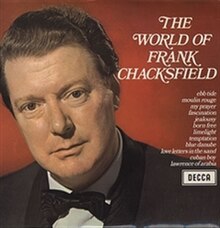Frank Chacksfield
| Frank Chacksfield | |
|---|---|
 |
|
| Background information | |
| Birth name | Francis Charles Chacksfield |
| Born |
9 May 1914 Battle, East Sussex, England |
| Died | 9 June 1995 (aged 81) Kent |
| Genres | Easy listening, pop |
| Occupation(s) | Bandleader, conductor, composer |
| Instruments | Piano, organ |
| Years active | c.1938–1991 |
| Labels |
Decca Phase 4 Starborne Productions |
Frank Chacksfield (9 May 1914 – 9 June 1995) was an English pianist, organist, composer and conductor of popular light orchestral easy listening music, who had great success in Britain and internationally in the 1950s and early 1960s.
Francis Charles Chacksfield was born in Battle, East Sussex, and as a child learned to play piano and organ. He had appeared at Hastings Music Festivals by the time he was 14, and then became deputy church organist at Salehurst. After working for a short period in a solicitor's office he decided on a career in music, and by the late 1930s, led a small band at Tonbridge in Kent. At the beginning of World War II, he joined the Royal Corps of Signals, and, following a radio broadcast as a pianist, was posted to ENSA at Salisbury where he became the arranger for Stars in Battledress, an armed forces entertainment troupe, and shared an office with comedian Charlie Chester.
After the war, he worked with Chester and on BBC Radio as an arranger and conductor. He also worked as musical director for both Henry Hall and Geraldo, and began recording under his own name in 1951 as "Frank Chacksfield's Tunesmiths". In early 1953, he had his first top ten hit, "Little Red Monkey", on the Parlophone label. This was a novelty recording featuring Jack Jordan on the clavioline, and reportedly the first record featuring an electronic instrument to feature on the UK pop chart. He signed a recording contract with Decca Records in 1953, and formed a 40-piece orchestra with a large string section, the "Singing Strings". His first record release for Decca, Charlie Chaplin's theme for his film Limelight, won him a gold disc in the United States, and in the United Kingdom, where it reached No. 2 in the UK Singles Chart, and won him the NME award as 'Record of the Year'. It spent eight weeks at No. 2 (an all-time UK chart record), and in all thirteen weeks in the top five chart positions, without dislodging Frankie Laine's, "I Believe". His next 78 single, "Ebb Tide", became the first British instrumental recording to reach No. 1 in some American charts, providing a second gold disc, and he was voted the most promising new orchestra of the year in the US.
...
Wikipedia
